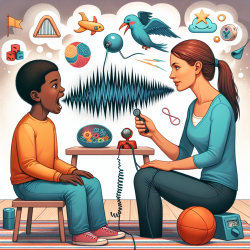Introduction
In the ever-evolving landscape of healthcare, the integration of biobanking insights into speech-language pathology presents a unique opportunity to enhance therapeutic outcomes for children. The research article "Has the Biobank Bubble Burst? Withstanding the Challenges for Sustainable Biobanking in the Digital Era" offers valuable insights into the challenges and opportunities within biobanking. By understanding these insights, speech therapists can leverage data-driven decisions to improve their practice and ultimately benefit the children they serve.
The Role of Biobanking in Precision Medicine
Biobanks are essential tools for translating biomedical research into practice, driving precision medicine, and improving global healthcare pathways. By systematically organizing biological samples and associated data, biobanks accelerate research efforts, allowing researchers to focus on analysis rather than data collection. This approach is particularly beneficial in speech-language pathology, where precision medicine can tailor interventions to the unique genetic and environmental profiles of each child.
Challenges and Opportunities in Biobanking
The research article outlines several challenges faced by the biobanking community, including operational, sustainability, and funding issues. Despite these challenges, biobanks offer immense potential for advancing personalized medicine. By addressing these challenges, speech therapists can enhance their practice by:
- Embracing Data-Driven Decisions: Utilizing biobank data allows therapists to make informed decisions based on comprehensive genetic and health information, leading to more effective interventions.
- Collaborating Across Disciplines: Engaging with biobank networks fosters collaboration with other healthcare professionals, enriching the therapeutic process with diverse insights.
- Enhancing Research and Development: By participating in biobank-related research, therapists contribute to the development of innovative therapies and techniques, ultimately improving child outcomes.
Implementing Biobanking Insights in Speech Therapy
To effectively implement biobanking insights, speech therapists should consider the following strategies:
- Integrate Biobank Data: Incorporate genetic and health data from biobanks into therapy plans to tailor interventions to each child's specific needs.
- Stay Informed: Keep abreast of the latest biobanking research and developments to continuously improve therapeutic approaches.
- Advocate for Biobank Participation: Encourage participation in biobank initiatives to expand the available data pool, enhancing the precision and effectiveness of speech therapy interventions.
Conclusion
By leveraging the insights from biobanking research, speech-language pathologists can enhance their practice, leading to improved outcomes for children. The integration of biobank data into therapy plans enables personalized, data-driven interventions that address the unique needs of each child. As the field of biobanking continues to evolve, staying informed and engaged with these developments will be crucial for speech therapists committed to creating positive outcomes for their young clients.
To read the original research paper, please follow this link: Has the biobank bubble burst? Withstanding the challenges for sustainable biobanking in the digital era.










